Canada
- November 2019 Canada report
- September 2019 Canada report
- The CONVERSATION is the RELATIONSHIP: Strategies for Employer Engagement in Post-Secondary Education
- Introducing the Canadian Council for Career Development (CCCD)
- Career Development Supports in Canada, December 2017
- Career Counseling and Mental Health: A Theme at the 2017 Canadian Counselling and Psychotherapy Association Conference
- Canadian Resources for the Creation and Mobilization of Knowledge in Career Development
- Career Development in Canada
October 2023 Canada Report
Labour market trends
Economy:
- The Bank of Canada’s most recent report (July 2023) shows that Canada’s inflation rate fell to 3.4% in May 2023 after a high of 8.1% in the summer of 2022. Consumer spending in 2023 has been surprisingly high, suported by a robust demand for labour, population growth, and higher household spendings.
- However, the economy is now slowing and high prices are a worry for many ac In addition, normal conversations with workers on the streets (grab bikes, taxis, supermarkets) and arouross the country who are struggling financially. Higher interest rates are expected to continue to stall the economoy into 2024. Inflation is expected to return to around 25 during 2025.
Career Development:
A new professional home for Canadian career development practitioners (CDPs)
The Canadian Career Development Foundation (CCDF) has led the development of a bilingual group for CDPC | CEDC community members to connect to resources and network with each other.
https://cdpc-cedc.ca/groups/cdpc-cedc/
CERIC has published a range of resources through Careering Magazine to support Indigenizing Career Development.
Employment:
- Current unemployment rate remains staedy at 5.5%
- Population in Canada has grown seeing its biggest ever increase of just over 1m people between July 2022 and July 2023. The population has grown to 40,097,761.
April 2023 Canada Report
Covid
On the whole, most of Canada seems to be moving on and acting like Covid-19 is now in the past, but it remains the #3 cause of death, especially for elders. Health authorities continue to advise masking where possible, and keeping up to date with booster vaccines, however there seems to be a large swathe of the population that is ignoring this advice.
Employment
The current unemployment rate is holding steady at 5%, just above the record low of 4.9% observed through June-July 2022. There has been a solid increase in jobs in good-producing industries, with service-producing industries holding steady at present. Youth unemployment however sits at just under 10% double that of adult counterparts. The Covid-19 impacts and recovery remain uneven for the youth demographic. Labour force participation is stated to be 85.7% for women aged 25-54, but this participation still includes lower paid and many precarious work positions.
Government of Canada
The current unemployment rate is holding steady at 5%, just above the record low of 4.9% observed through June-July 2022. There has been a solid increase in jobs in good-producing industries, with service-producing industries holding steady at present. Youth unemployment however sits at just under 10% double that of adult counterparts. The Covid-19 impacts and recovery remain uneven for the youth demographic. Labour force participation is stated to be 85.7% for women aged 25-54, but this participation still includes lower paid and many precarious work positions.
The Federal Government of Canada has just released its Budget 2023. Three core focuses are:
- Making life more affordable
- Stronger public health and dental care
- Growing a green economy
- Expect to see implications for jobs in connected sectors for all of these strands.
Career Development in the Mainstream Media
The Globe and Mail have been running several news and opinion pieces that are connected to career development. It is good to see the sector as being deemed “newsworthy” but frustrating that the role of career development professionals is not more significantly featured. A range of the news items can be found here…
Career Development News
The Career Development professional Centre has launched! This initiative, led by the Canadian Career Development Foundation is a virtual hub where professionals working in the sector can engage in community learning and foundational training and come together to amplify the importance of the career development profession to the health and well-being of people, communities, and Canada.
CERIC
CERIC has a new Executive Director, Kay Castelle who replaces Riz Ibrahim who has moved across to become the President and CEO of the Counselling Foundation of Canada. Kay began her new role of February 27 2023.
CERIC has updated its toolkit to support employers to address their talent needs. A free copy can be found here…
Some interesting free events/resources
The 4th Annual College Student Success Innovation Centre Symposium is taking place on May 2. It is fully online and free to attend.
Academia Forum has a series of interesting short reads on a range of post-secondary topics, including a look at how post-secondary students are using ChatGPT. They can be found here…
November 2022 Canada Report
November is Career Month in Canada (and beyond!)
- What is career month?
“Each November, Canadians from coast-to-coast-to-coast celebrate the importance of accessing meaningful work and all those that help us in connecting with our preferred futures. Canada Career Month volunteers work to advance the agenda of improving access to career services and education so that all Canadians are better prepared to develop their careers and transition into the emergent labour market”(https://careermonth.ca/about/)).
A range of events are showcased – and can be accessed on this page. Expect more events to be added as the month goes on!
See what the career month authors have to say…
Government of Canada
Jobs are now categorized according to the job duties and the work a person does. These classifications are also used for benchmarking for the skilled worker immigration routes to Canada.
As part of this update, a suite of resources are available on the ESDC website, including career quizzes, exploring fields of study, and career tool factsheets.
CERIC

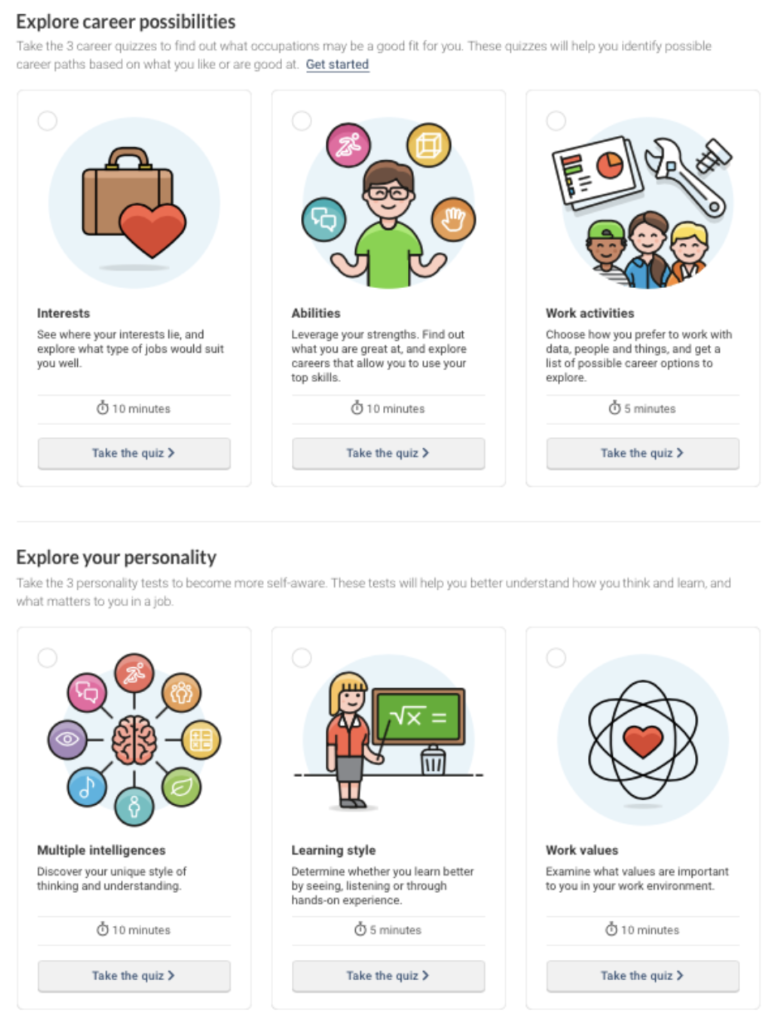
August 2022 Canada Report
Economy (Data from OECD & StatsCan, June 2022)
Canada’s economy is slowly recovering from the COVID-19 crisis. Domestic demand is picking up following the easing of containment measures. Exports are expected to strengthen, demand for commodities buoying trade amid shocks to world growth. Limited trade ties to economies hard-hit by the war in Ukraine, and income from high resources prices, shield Canada from larger economic impacts. Real GDP is projected to grow by 3.8% in 2022 and 2.6% in 2023. Unemployment will remain low as output rises slightly above potential. Global supply tensions will keep price growth high this year, compounding underlying inflationary pressures.
Building a more resilient and inclusive economy requires strengthening welfare policy. The pandemic highlighted a general problem of weak backing for those unemployed or experiencing poverty, the gender- wage gap remains large and Indigenous peoples remain under-privileged in most socio-economic dimensions.
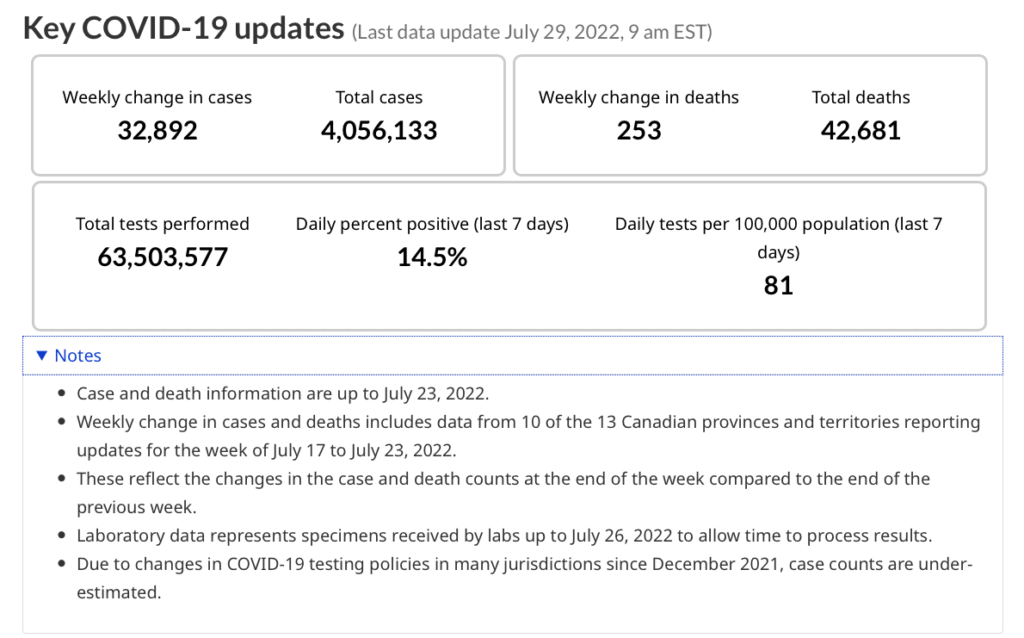
The Future Skills Centre has been focusing many initiatives at supporting Indigenous youth, workers, businesses and communities. A wide range of interesting reports on these initiatives can be found here:
The Future Skills Centre funded a two-year pilot project aimed at supporting skills development in universities, with specific focus on marginalized populations of students. The FUSION project was rolled out across six universities; Simon Fraser University (BC), University of Saskatchewan (Saskatchewan) , Memorial University (Labrador & Newfoundland), Concordia University (Quebec), University of Calgary (Alberta), and Carleton University (Ontario).
At Carleton we are expanding this project, and have developed new skills modules. The modules are self-directed, and take students around 3 hours to complete. We are currently collecting data, and early indications are pointing to a very successful program. Please have a look at the following link. I recommend watching the video!
More information can be found here:

May 2022 Canada Report
COVID
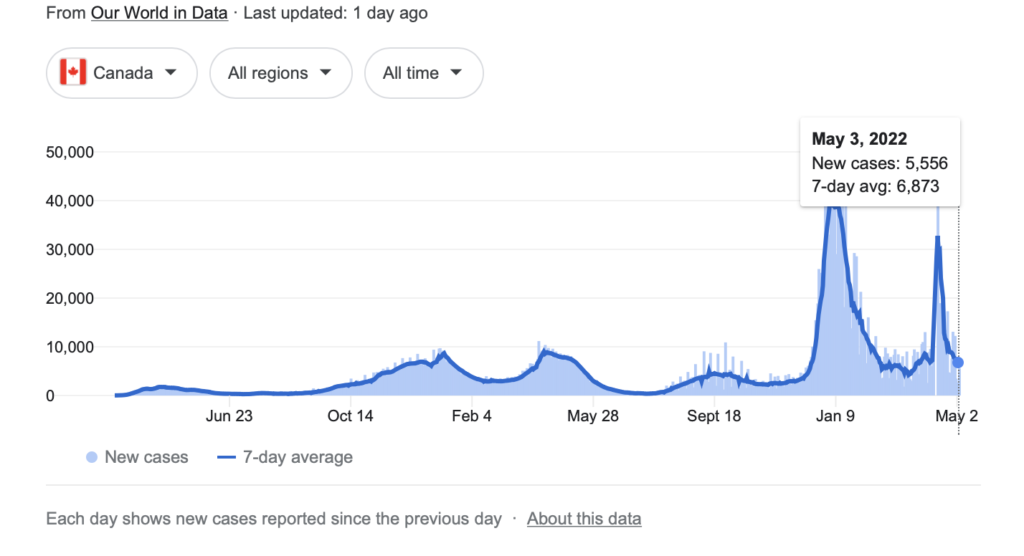
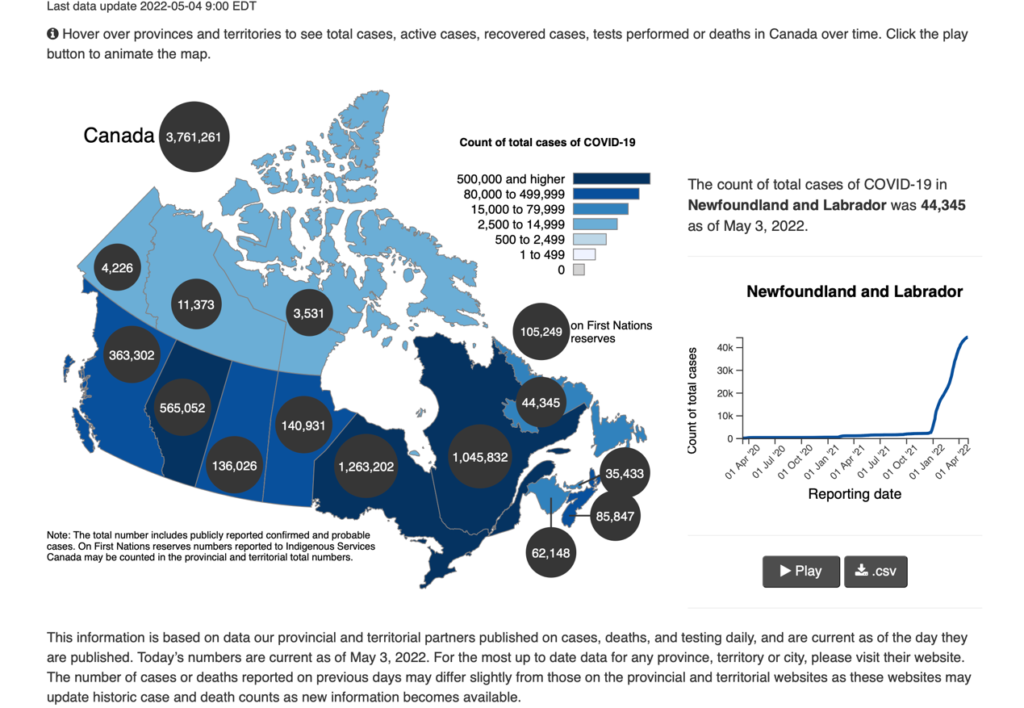
Unemployment
Canada’s unemployment rate dropped to lowest level on record in March to 5.3% Canada’s economy added 73,000 jobs last month, a little less than economists were expecting but still enough to push the official jobless rate to 5.3 per cent, the lowest level seen on records dating back to 1976.
Career Development News
- Providing a home for the Competency Framework, National Profile, Code of Ethics, and associated resources and a hub to promote their integration and application Supporting CDPs to access basic, foundational training, at no to low cost, on the career development process, helping to ensure a common language and an understanding of the full scope of career development practice
- Creating and nurturing a community of practice, where CDPs can exchange and grow with respect to their practice, application of learning, and further development needs
- Establishing a central hub as a one-stop for CDPs to find out about the full range of existing training available to them, as well as professional supports/associations and national/international developments that matter to our profession
- Being a unified voice to advocate for our sector and our critical contribution to the socio-economic health of individuals, communities, and our nation.
The new Canadian Competency Framework and Code of Ethics can be found here:
February 2022 Canada Report
Pandemic Update

Most K-12 schools are now back to in-person learning, with some families opting to keep their children home and online. In colleges and universities there are a mixture of approaches across the provinces and territories, with some being back to in-person, and most phasing in a return to in-person over the early part of 2022. I think most will be back to predominantly in-person by late spring/early summer. We are seeing easing of restrictions, cessation of widespread testing, and a demand from some sectors of society to “get back to normal” however, the healthcare sector remains heavily impacted, and in the main – overwhelmed. As such, we are seeing staff shortages, due to unprecedented levels of folks leaving the sector. The chart below shows that though people may feel like they are done with Covid-19, the virus is not yet done with us, though things are improving. On the plus side, around 80% of the population is now vaccinated.
Reports and Interesting Career-Related News
There is a fairly constant amount of research activity that may be of interest to members, including:
CERIC
The latest issue of the Canadian Journal of Career Development marks the 20th anniversary of the journal. It is freely available here:
The Diversity Institute
Labour Market Information Council (LMIC)
The Diversity Institute have recently published a range of reports that may be of interest to members, including their 2021 Impact Report, and reports that examine how workplace regulations and culture will impact the post-pandemic recovery, plus the impact of the pandemic on young adults in Canada. The range of reports can be accesses for free here:
LMIC have just published an interesting report that assesses whether adults are making use of career services in Canada. Key findings include:
The COVID-19 pandemic led to a historic disruption in the job market, bringing renewed attention to the availability and access of services to support Canadians in their career choices.
- Almost one in five adults aged 25–64 have received career services in the past five years, compared to half of youth aged 18–24.
- Among adults, the likelihood of using career services differs significantly between groups. Men, those with post-secondary education, immigrants and unemployed people are more likely to use career services:
- Men (23%) are more likely to use career services than women (18%)
- Adults with post-secondary education (29%) are more likely to use career services than those with less education (17%)
- Immigrants to Canada (27%) accessed career services more than Canadian citizens (17%)
- Unemployed persons (27%) accessed career services more than the employed (24%) or those not in the labour force (10%)
- Career services are used about equally across regions
- Nearly everyone who engaged with career services reported some positive impact, although many report key gaps in the provision of labour market information. Yet large numbers of Canadians are not accessing career services, either because they are not aware of them, don’t feel the need for them or face access barriers. And compared to other OECD countries, the use of career services is much lower in Canada.
- Wider awareness about career services is needed in Canada, especially for groups most vulnerable to career disruptions. Equipping career service providers with labour market information tools, skills and capacity to better serve the needs of Canadians will be critical moving forward.
November 2021 Canada Report
Covid-19
The situation remains ongoing with the impact of Covid-19 continuing to be felt across Canada. The graphic below presents the latest data as of November 5.

Career Development News
Canada Career Month
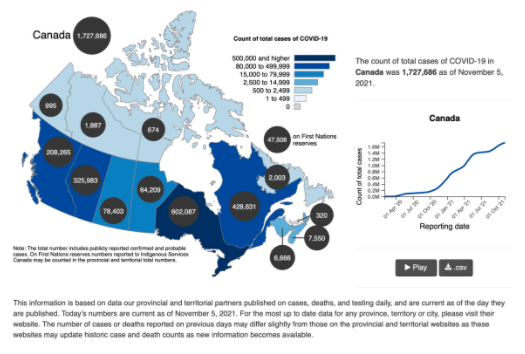
LMIC
ADDITIONAL RESOURCES
August 2021 Canada Report
BIG NEWS!
The brand-new National Competency Profile for Career Development Professionals was launched last week! The Framework has been 3 years in the making, and replaces the previous CPD Standards and Guidelines (2004). Over 600 CPDs across Canada contributed to the Framework, and a new certification process is forthcoming as is a CPD Code of Ethics. You can access the Framework here:
http://ccdp-pcdc.ca/en/
If you click on the pdf symbol you will be able to download the framework.
Additional pieces are to be added over the coming months, for example there will be competencies specifically for educators who do careers work in schools. I will update you with these as they come online.
The Federal Government of Canada recently launched a revised skills framework called Skills for Success.

Future Skills Centre
The latest research from the Future Skills Centre includes some interesting reports focussing on Indigenous initiatives and partnerships and how STEM is helping Indigenous workers in the north of Canada adapt to technological change. You can access these reports here:
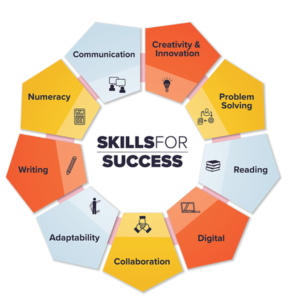
The LMIC

The Labour Market Information Council is a not-for-profit organization that began in 2018 through a Forum of all of the Labour Market Ministers across Canada (13 provinces and territories). The LMIC has a mandate is to improve the timeliness, reliability and accessibility of labour market information to facilitate decision-making by employers, workers, job seekers, academics, policy makers, educators, career practitioners, students, parents and under-represented populations. In the past year, it has stepped up its work due to Covid-19 and there are a range of reports of interest now being published which can be accessed here:

On a more personal note, I am thrilled to have just published an article co-authored with Dr. Tristram Hooley in the British Journal of Guidance and Counselling. For those interested I believe there are still a few free copies available at the following link.
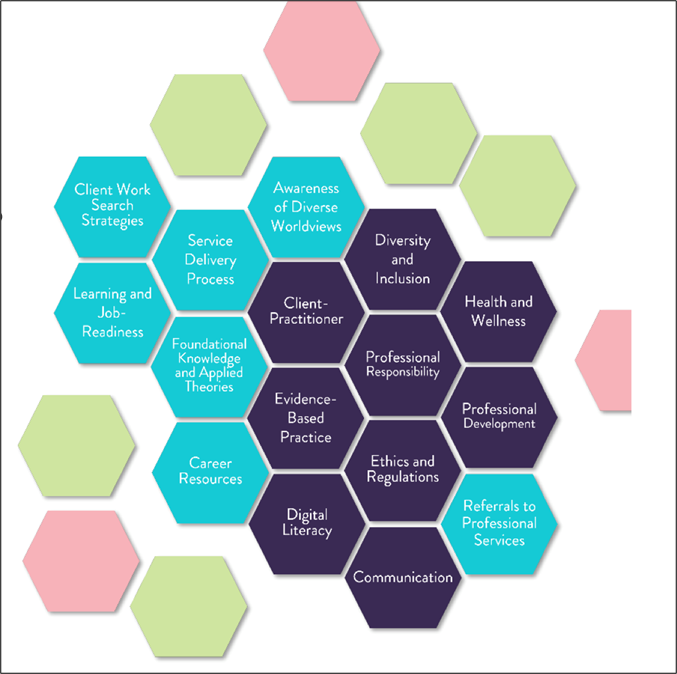
May 2021 Canada Report
Covid-19 Related News
Covid-19 continues to significantly impact life in Canada. Spring 2021 has seen a surge in numbers again that has let to various periods of shut-down across different provinces and territories. Most children are still attending school, but under specific conditions, and some students remain at home working remotely. Many colleges and universities are continuing to operate remotely, students are reporting anxiety and stress and institutions are stretched in providing additional and much-needed supports.
CERIC has published some survey results of the impact of Covid-19 on the career development field across Canada. They can be found here.
Career Development Related News
Future Skills Centre: Current Initiatives
The Future Skills Centre has made a significant $32m investment in 64 funded projects explore ways that evolving or emerging sectors and technologies can support workers displaced from socio-economic shocks as well as strengthening the economy of tomorrow. As Canada faces the reality of an extended recovery period for many sectors and populations, the launch of these projects will explore emerging opportunities to support longer term views for skills and employment development. By testing real world solutions, the projects aim to help workers — especially those facing multiple barriers to full employment – in acquiring the skills they need to thrive despite changes in the workforce.
OpportuNext
The Conference Board of Canada and the Future Skills Centre are excited to launch a free online tool designed to help jobseekers, job placement professionals, and employers quickly and easily explore viable career transition pathways. This is a response to how Canada’s job market has experienced unprecedented, accelerated change in the past few years due to a number of factors, including rapid technological innovations and, most recently, the COVID-19 pandemic. As a result, many Canadians are looking to transition to new career paths in search of desirable long-term employment, and employers are looking for innovative solutions to HR challenges.
CEWIL
Latest employment data (reference period June 2021)
Unemployment rate decreased to 4.9%, Underemployment rate increased to 7.9%
Participation rate remained at 66.2%, Total vacancies (May) were 362,500 (an increase of 23.5% from Feb)
Post-secondary students throughout Canada will have access to new, innovative work-integrated learning opportunities thanks to a strong partnership between the Government of Canada (Employment and Social Development) and Co-operative Education and Work-Integrated Learning (CEWIL) Canada. The partnership includes $16.3 million, funded in part by the Government of Canada’s Innovative Work-Integrated Learning program to CEWIL to fund grants that will enable the creation of curricular work-integrated learning (WIL) focusing primarily on applied research/industry projects, entrepreneurial WIL, field placements, and service-learning WIL. CEWIL is accepting proposals for 8150 WIL experiences through its new CEWIL Innovation Hub (iHUB), a centre of expertise that supports the advancement, innovation and access to WIL while ensuring projects are delivered with appropriate quality and learning standards for students.
All projects funded and overseen by iHUB will address one or more of the following key outcomes:
- Expanding access to WIL opportunities, particularly for under-represented students;
- Removing barriers for students to participate in work-integrated learning;
- Leveraging technology to enhance programming or extend access, including the use of technology to support virtual or remote WIL experiences in response to COVID-19;
- Innovating work-integrated learning through new partnerships and new models for curricular WIL.
Cannexus 22
The call is out for proposals for Cannexus 22 – proposals are due by June 3, 2021. The conference will be of hybrid format, with some content online and some face-to-face.
Resources from CERIC
Latest career development news can be found in Careerwise and Careering – both publications from CERIC and available for free download here…
October 2020 Canada Report
Career Development News
Cannexus 21: Career Development for the Public Good is taking place over 25 & 26 of January and 1 & 3 February. The program has been announced and is rich and varied, and promises to ensure that Cannexus remains Canada’s most popular development conference. Registrations are at very healthy levels, and indicated a much wider geographic spread of attendees. You can register atThe fall issue of Careering is out and features articles that highlight career superpowers, and is available from
Canada Career Month
takes place annually in November. Each November, Canadians from coast-to-coast-to-coast celebrate the importance of accessing meaningful work and all those that help in connecting Canadian with their preferred futures. Canada Career Month works to advance the agenda of improving access to career services and education so that all Canadians are better prepared to develop their careers and transition into the emergent labour market. This year’s theme is On the Move: Stories of Career Resiliency and the 3CD have produced a great visual featuring “eight ways career development gets you going” available at

COVID-19 and related employment updates
Many provinces are now experiencing rising numbers again with COVID-19. Canada has now had over 222,000 cases and just over 10,000 deaths, with the most cases reported in Quebec, followed by Ontario, Alberta, and BC. The general unemployment fell to 10.2% in August after reaching 13.7% in May, the highest rate since comparable available data in 1976. Youth unemployment dropped to 18.9% in September after an all-time high of 29.4% in May. Previously youth unemployment was fairy steady at around 14% (Statistics Canada, 2020) The Government of Canada continues to offer financial relief to those impacted most significantly by COVID-19, including (i) a Canada Recovery Benefit (CRB) of $500 per week for up to 26 weeks, for workers who are self-employed or are not eligible for EI and who still require income support; (ii) a Canada Recovery Sickness Benefit (CRSB) of $500 per week for up to two weeks, for workers who are sick or must self-isolate for reasons related to COVID-19; and (iii) a Canada Recovery Caregiving Benefit (CRCB) of $500 per week for up to 26 weeks per household, for eligible Canadians unable to work because they must care for a child under the age of 12 or a family member because schools, day-cares or care facilities are closed due to COVID-19 or because the child or family member is sick and/or required to quarantine.
Future Skills Centre
(Federal Government funded) has been investing heavily in innovative and community-based programs that aim to find solutions for Canada’s changing workforce needs. A summary of some of the projects funded to date is now available with a heavy focus on disadvantaged and under-represented groups. The focus includes leveraging people and AI technology, to training, reskilling, and adapting within industries facing chronic skills shortages, to radical new approaches to training and learning in order to build capacity to creating an inclusive workforce for the future by not leaving anyone behind.
https://www.nationalskillscommission.gov.au/our-work/australian-skills-classification
July 2020 Country report
- Many provinces are moving forward with opening up strategies as COVID-19 numbers hold steady and/or decline. The general unemployment fell to 12.3% in June after reaching 13.7% in May, the highest rate since comparable available data in 1976. Youth unemployment dropped to 27.5% in June after an all-time high of 29.4% in May. Previously youth unemployment was fairy steady at around 14% (Statistics Canada, 2020)
- The gradual easing of COVID-19 restrictions and the re-opening of the economy presents both opportunities and challenges for employers and workers. For employers, this includes adapting workplaces while adjusting to disruptions in global supply chains and uncertainties in consumer demand. For workers, the challenges vary, from returning to a previous employer, to looking for a new job, adapting to new ways of working, or making child care arrangements.
- Data is confirming that more women than men have lost jobs in Canada (1.5m jobs lost over March/April 2020), women make up approximately 40% of household income and there is concern about the longer term impact of this situation.
- COVID-19 has exposed social inequities – more women are employed in marginal jobs, they tend to earn less, and represent the vast majority of health care, child care, and elder care workers.
- Many universities and colleges across the nation are planning for a fully-online or blended approach for the Fall 2020 term. Some institutions are beginning to announce that the entire academic year 2020/2021 will be at least partially online.
- Planning is underway across provinces and territories for a return to K-12 schools in the fall, but as yet it is not clear whether students will attend schools on a full-time basis, how much programming may be switched to an online model. As more and more businesses begin to open up, this is causing longer-term childcare concerns.
- The Canadian Career Development Foundation (CCDF), CERIC, and Challenge Factory published a joint letter on June 19 in response to the Canadian Chamber of Commerce’s statement on June 9, 2020, about getting Canadians back to work in a coordinated and strategic way.
- Despite vast and ongoing challenges of the current global pandemic, Canada’s career and employment services are showing remarkable resilience and innovation. By leveraging technology, 89% are reporting they are delivering programs and services remotely. These findings come from the new CERIC Recovery Pulse Survey, which gathered input on the impact of COVID-19 on career services across the country. A total of 1,146 career development professionals responded to the survey between June 4 and 12.
April 2020 Country report
National/Federal
At federal level, actions being taken to respond to COVID-19 dominate. All sectors of society are impacted significantly.
- Most provinces and territories have states of emergency in place either provincially or locally within provinces.
- Schools, universities, colleges, and many workplaces are closed.
- Workplaces deemed to supply essential services or products are open with restricted hours and ways of doing business (predominantly online).
- Most educational institutions have moved delivery of classes and courses online – with significant impact on ways of teaching and learning.
- The federal government has instigated emergency funding packages to those who have lost jobs or who are temporarily unable to work. Long term and far reaching economic implications are expected.
https://lmic-cimt.ca/projects/now-of-work/
- The Canadian Career Development Foundation will be launching resources soon – keep an eye on the website for more details:
- CERIC has sourced a variety of resources to support career professionals navigating COVID-19
November 2019 Country report
The big news from Canada is that we are in the midst of “Canada Career Month”
Every year, for the entire month of November, Canadians from coast-to-coast-to-coast celebrate the importance of accessing meaningful work and all those that help us in connecting with our preferred futures. Canada Career Month works to advance the agenda of improving access to career services and education so that all Canadians are better prepared to develop their careers and transition into the emergent labour market.
It is a time when all of us who work in career development related roles attempt to educate about, advocate for, and promote career development to all Canadians. We do this through a range of promotional events across Canada including:
- Celebration events in schools, colleges, and university campuses
- Information sessions in libraries, employment centres, career associations
- Appearances on local and provincial TV and radio
- A conference in New Brunswick
- A series of webinars made available to wider public through some libraries
This momentous focus on career development is organized and coordinated by The Canadian Council for Career Development (3CD), which is a self-initiated and self-funded umbrella group for career development associations and related partner groups from across Canada. 3CD provides a national advocacy voice for the career development field and promotes provincial/territorial collaboration on common issues such as standards, competencies, training, quality, certification, practitioner mobility, and the evidence base.
September 2019 Canada report
by Lorraine Godden
1. The New CDP Competency Framework
Work is continuing on developing an updated and revised competency framework. This is a Federal Government funded initiative, being led by the Canadian Council for Career Development (CCCD) in partnership with the Canadian Career Development Association (CCDF). Full project details can be found here:
2. The Future Skills Centre – Centre des Compétences futures (FSC-CCF)
The FSC-CCF is a Federally funded centre for research and collaboration that is governed by a consortium of partners. It was launched in early 2018 and has already funded a number of projects that are now underway. It focuses on four pillars: Stakeholder Network; Research; Innovation Projects; and Knowledge Mobilization. Please see
The FSC-CCF funded 10 projects in June 2019 totalling $7.65M CAD and has just put out a call for proposals on August 14 to help strengthen Canada’s Skills Development Ecosystem with an investment of $36M CAD.
3. Cannexus20
Planning for Cannexus20, Canada’s largest bilingual National Career Development Conference is underway. Eight Mega Presenters have been announced, and key note speakers are Tristram Hooley (UK), Natan Obed (Canada’s National Inuit Leader), and Zita Cobb (CEO). Over 1200 delegates are expected to attend.
4. CERIC
CERIC launched Career Theories and Models at Work edited by Nancy Arthur, Roberta Neault, and Mary McMahon at Cannexus19. The book has been well received across our sector and can be ordered at
5. Labour Market Information Council (LMIC)
Two reports have recently been released: LMIC Annotated Bibliography/Future of Work which can be found at
6. Brookfield Institute
Recently launched a report Turn and Face the Strange: Changes Impacting the Future of Employment in Canada, a report that highlights the diverse and intersecting drivers of change in Canada’s labour market. The report outlines a number of policy implications. A copy of the report can be found here:
Provincial/Territorial (Regional)
1. The Canadian Career Development Foundation (CCDF)
The CCDF has just released its report Transitioning from Public School to Post Secondary Education in the Atlantic Region: Issues Challenges and Approached to Support Success a policy document that provides recommendations for enhancing the role of public education in supporting student transitions. A copy can be found here:
2. The Manitoba Association for Career Development (MACD)
Let’s Get to Work 2019 conference takes place in November. Focus of the conference is supporting career development practitioners with employment related issues in Manitoba.
3. The British Columbia Career Development Association (BCCDA)
The BCCDA conference took place in May 2019 and the 2020 call for proposals and registration is now out. Further details can be found here
4. The Career Development Association of Alberta (CDAA)
5. The Saskatchewan Career Development Association (SKCDA)
The SKCDA does not hold its own annual conference, however it supports the attendance of its members at Cannexus. The SKCDA provides a number of resources for its membership, some of which can be accessed here:
6. The Career Development Practitioners’ Certification Board of Ontario (CDPCBO)
The CDPCBO has launched a mentoring program for members who are considering certification through the CDPCBO. Recruitment of mentors is currently taking place. Further details can be found here:
7. The New Brunswick Career Development Association (NBCDA)
The NBCDA annual career development conference will take place in November 2019. Further information can be found here:
8. The Nova Scotia Career Development Association (NSCDA)
The NSCDA held its annual conference in June 2019, not details of the 2020 conference have been announced to date. The NSCDA is currently evaluating its Career Development Practitioner Certification Program. Updates will be available here:
The CONVERSATION is the RELATIONSHIP: Strategies for Employer Engagement in Post-Secondary Education
by Dr. Candy Ho, Professor, Educational Studies, Kwantlen Polytechnic University, Canada
 Within the Canadian context, there has been a continual trend for post-secondary educational institutions to partner with organizations and employers to develop and offer meaningful experiential learning opportunities for students. For instance, in 2015, the Business/Higher Education Roundtable (2019), represented by leading companies and post-secondary institutions, declared an ambitious goal of having 100% of undergraduate students gain access to work-integrated learning (WIL) opportunities prior to graduation. To date, major companies in industries such as finance, mining and aerospace are pledging to increase their offering of WIL opportunities to post-secondary students.
Within the Canadian context, there has been a continual trend for post-secondary educational institutions to partner with organizations and employers to develop and offer meaningful experiential learning opportunities for students. For instance, in 2015, the Business/Higher Education Roundtable (2019), represented by leading companies and post-secondary institutions, declared an ambitious goal of having 100% of undergraduate students gain access to work-integrated learning (WIL) opportunities prior to graduation. To date, major companies in industries such as finance, mining and aerospace are pledging to increase their offering of WIL opportunities to post-secondary students. The trend presents both opportunities and challenges for institutions to identify suitable organizations and employers who will offer these various forms of meaningful opportunities for students. Scott’s (2011) quote of “the conversation is the relationship” (p. 5) comes to mind as a motto to embrace when striving to develop mutually beneficial partnerships. Below are three key strategies to help post-secondary institutions enhance their CONVERSATIONS – and in turn, their RELATIONSHIPS – with employers.
A. Establish clear outcomes and expectations. When engaging new employers, during the intake process, consider asking the following:
- What do you want out of this potential engagement?
- What are the pain points you wish to alleviate by offering WIL opportunities?
For instance, many accounting firms see hiring co-operative education students or student interns as an effective short-term solution during the busy tax season.
This initial conversation is also an opportunity for institutions to outline the employer’s critical role as educators in the workplace. In my own experience, I see this conversational piece getting overlooked at times, and in turn leading to misunderstanding of employer and institutional expectations in this collaboration. Having the conversation now can mitigate risk and maximize the experience for students, employers and institutions.
B. Recognize longstanding employers who are strong contributors. While appreciation events, plaques and certificates are popular approaches to appreciating loyal employer partners, it is important to make recognition genuine and regular. Consider collecting student testimonials on their positive work experience with the company and make it a habit to pass them onto those who supervise students, and better yet, their supervisors.
Turn these recognition opportunities into two-way conversations: ask employers how you and your institution can further enhance their experience as educators in the workplace. They may also be invited to impart their best practices at future employer events, or even be guest speakers in classes to talk about the realities of the workplace, which can act as a recruitment tool for them as well.
C. Partner and engage with your post-secondary counterparts. This last one seems somewhat counterintuitive, yet, there are tremendous benefits to partnering with other nearby institutions to implement a joint employer engagement strategy. Notable examples include the Association for Co-operative Education and Work-Integrated Learning British Columbia/Yukon (ACE-WIL BC/Yukon) and Co-operative Education and Work-Integrated Learning Canada (CEWIL Canada). Representing multiple institutions, these associations advocate for the importance for WIL with companies and agencies, as well as government on both provincial and federal levels. As each school might be distinct in mission and program offering, working together as a post-secondary contingency means that employers would have more choices in student talent, further solidifying the argument to provide WIL opportunities.
Ultimately, high quality conversations between employers and institutions enhance employer engagement, which has the potential to elevate the reputation of the institution, and possibly, the overall reputation of post-secondary career services as a key contributor to our society and economy. This results in a win-win-win scenario whereby the employers are leading great talent and future recruitment potential, the institution is increasing its opportunity to provide meaningful connections to industry, and students are yielding practical opportunities to build their skills and networks that ideally positions them for smoother transitions post-graduation.
References
Business/Higher Education Roundtable. (2019). Work-integrated learning: Getting to 100%. Retrieved from:
Scott, S. (2011). Fierce conversations: Achieving successes at work & in life, one conversation at a time. New York: The Berkley Publishing Group.
Introducing the Canadian Council for Career Development (CCCD)
by Jon Woodend
 The Canadian Council for Career Development (CCCD) is a selfinitiated/funded group for career development associations across Canada that will celebrate its 10th anniversary in 2018. The aim of CCCD is to promote the voice of professionals within the career development field and to further outreach and engagement. CCCD offers membership and certification to help connect professionals in Canada, as well as tools to support career development practice, including a guide detailing Canadian Standards & Guidelines for Career Development Practitioners. The CCCD has several working groups that function to support professionals and further the field. To learn more about CCCD, please see:
http://cccda.org/
The Canadian Council for Career Development (CCCD) is a selfinitiated/funded group for career development associations across Canada that will celebrate its 10th anniversary in 2018. The aim of CCCD is to promote the voice of professionals within the career development field and to further outreach and engagement. CCCD offers membership and certification to help connect professionals in Canada, as well as tools to support career development practice, including a guide detailing Canadian Standards & Guidelines for Career Development Practitioners. The CCCD has several working groups that function to support professionals and further the field. To learn more about CCCD, please see:
http://cccda.org/ Career Development Supports in Canada
by Jenny L. Rowett, MEd, CCC-S, LCT
 November is Canada Career Month! This specialized focus aims to increase awareness on issues pertaining to employment in Canada and is recognized across the country as providing a valuable platform to address some of the concerns that exist when it comes to planning one’s career. “Making career-related decisions and transitions such as pursuing education/training, looking for suitable employment, balancing life/work roles and responsibilities, and preparing for retirement are faced by almost everyone at some point,” reports Canadian Counselling and Psychotherapy Association (CCPA) National President, John Driscoll. “Now more than ever, Canadians are more frequently working in multiple jobs throughout their lifetimes, and navigating that process can be complicated and overwhelming. Career counsellors and the services that they provide can be extremely helpful for those seeking support.” This article will highlight two national supports for career counsellors and career development in Canada.
November is Canada Career Month! This specialized focus aims to increase awareness on issues pertaining to employment in Canada and is recognized across the country as providing a valuable platform to address some of the concerns that exist when it comes to planning one’s career. “Making career-related decisions and transitions such as pursuing education/training, looking for suitable employment, balancing life/work roles and responsibilities, and preparing for retirement are faced by almost everyone at some point,” reports Canadian Counselling and Psychotherapy Association (CCPA) National President, John Driscoll. “Now more than ever, Canadians are more frequently working in multiple jobs throughout their lifetimes, and navigating that process can be complicated and overwhelming. Career counsellors and the services that they provide can be extremely helpful for those seeking support.” This article will highlight two national supports for career counsellors and career development in Canada. CCPA is a national, bilingual association providing professional counsellors with access to educational programs, professional development, certification and opportunities to connect with peers and speciality groups. As the leading national association and advocate for the profession of counselling in Canada, CCPA promotes the advancement of the profession and increases awareness about its role in healthcare, education and industry sectors. Career counsellors, an essential component of CCPA’s membership, act as resources to individuals considering their educational paths, employment opportunities and life transitions. From enhancing self-awareness, to reviewing labour market demands, to helping determine educational requirements for a given sector, career counsellors play a crucial role in assisting those individuals entering the labour force for the first time, or those considering career changes at a later age.
The Career Counsellors Chapter of CCPA was established in 1995, and has contributed toward the development of the standards and initiatives of the field of career development in Canada. This special interest chapter supports career development practitioners through professional development opportunities, by providing materials to assist in the delivery of quality service and by creating and recognizing new initiatives in the field. It also provides a forum for discussion of important issues in the field. The chapter acts as a means for practitioners, researchers and policy makers in the area of career development to assist each other in developing new programs. The chapter also offers a special award for a student studying in the field of career development, the Dr. Vance Peavy award. More information about the Career Counsellors Chapter can be found on CCPA’s website: https://www.ccpa-accp.ca/chapters/career-counsellors/.
The Canadian Career Development Foundation (CCDF) is a non-profit organization that works to advance career services and the capacity of the profession, both nationally and internationally. For example, the organization advocates for services that help to prepare youth for the workplace, helps to build capacity in employees in the management of their careers and strengthens the capacity of employers to create healthy work environments. CCDF conducts applied research, promotes policy consultation, develops and delivers resources and training courses, and works with diverse partners to enrich and strengthen career services. More information is available on their website: www.ccdf.ca.
My own professional experiences, as a certified member of CCPA and as practitioner who has utilized CCDF’s unique resources for pre-employability services that are offered in the province of New Brunswick, have been truly rewarding. CCPA membership has been an inspiring way to connect with career development professionals and resources in Canada. Membership has led to the international expansion of my professional network, including being led to, learning about and writing for the Asia Pacific Career Development Association!
Career Counseling and Mental Health: A Theme at the 2017 Canadian Counselling and Psychotherapy Association Conference
by Dr. Rebecca Hudson Breen
 Although the role of career and employment in an individual’s overall experience of wellbeing is well known, there continues to exist a divide between career counseling and personal counseling. At this year’s Canadian Counselling and Psychotherapy Association (CCPA) conference, held in St. John’s, Newfoundland, members of the Career Counsellor’s Chapter presented a pre-conference workshop in an effort to directly challenge this false dichotomy. In this workshop, the presenters illustrated the ways in which career counseling interventions may be incorporated in mental health counseling. Career interventions can support mental health across the developmental lifespan, from normalizing career indecision and enhancing career self-efficacy for post-secondary students, to supporting the career development of Indigenous young people, to addressing mid-life career change, to including career counseling interventions in treatment for individuals in recovery from addictions.s.
Although the role of career and employment in an individual’s overall experience of wellbeing is well known, there continues to exist a divide between career counseling and personal counseling. At this year’s Canadian Counselling and Psychotherapy Association (CCPA) conference, held in St. John’s, Newfoundland, members of the Career Counsellor’s Chapter presented a pre-conference workshop in an effort to directly challenge this false dichotomy. In this workshop, the presenters illustrated the ways in which career counseling interventions may be incorporated in mental health counseling. Career interventions can support mental health across the developmental lifespan, from normalizing career indecision and enhancing career self-efficacy for post-secondary students, to supporting the career development of Indigenous young people, to addressing mid-life career change, to including career counseling interventions in treatment for individuals in recovery from addictions.s.
The importance of the role of career in mental health was also highlighted in the keynote address by Dave Redekopp, “Career Development and Mental Health” and was carried through in an interactive discussion session following the keynote, facilitated by Dr. Redekopp, aimed at generating action in increasing understanding regarding the links between career and mental health. The importance of career for various populations was also seen in several posters and presentations throughout the main conference. These included a presentation on the strengths inherent in an intentional blending of career counseling with personal counseling to support wellbeing (presented by Clarence DeSchiffart and Laurie Edwards) and the role of career counseling in supporting street involved youth (presented by Yaffa Elling).t to them.
In discussions with my colleagues who are members of the Career Counsellor’s chapter, we agreed that it was encouraging to see that the importance of career in mental health was such a strong theme at this year’s CCPA conference. I, for one, look forward to a continued dialogue regarding the link between career and mental health, as well as ongoing research to support the integration of career interventions in mental health counseling.
Canadian Resources for the Creation and Mobilization of Knowledge in Career Development
by José F. Domene
 In this country report, I provide a description of Canadian resources for the creation and mobilization of knowledge related to career development and career counselling. Although these resources are located in Canada, many are available for career development practitioners both inside and outside of Canada. The specific examples that I describe are not an exhaustive list, but illustrate the range of resources that exist. At the end of this article, I provide links to many of these resources, for more in-depth exploration.
In this country report, I provide a description of Canadian resources for the creation and mobilization of knowledge related to career development and career counselling. Although these resources are located in Canada, many are available for career development practitioners both inside and outside of Canada. The specific examples that I describe are not an exhaustive list, but illustrate the range of resources that exist. At the end of this article, I provide links to many of these resources, for more in-depth exploration. At the other end of the research process, the mobilization of knowledge to key stakeholders (e.g., career development practitioners in the field, career development policy makers and the institutional and government levels) is as important as its creation: Without mobilization, how will research impact practice and policy? In Canada, there are numerous ways to spread the word about innovative practices and research findings, in both written and interactive formats. There are two main Canadian journals where career development researchers and practitioners from around the world can publish their work, in English or in French. The Canadian Journal of Counselling and Psychotherapy, the official journal of the CCPA, publishes research reports, descriptions of innovative programs and practices, discussions and commentaries on current professional issues, and critical reviews of published research related to all fields of counselling, including career counselling. A review of the archives of the journal reveals that career counselling and development is well represented in the journal.
Furthermore, as the current Acting Editor for the journal, I can personally reassure my APCDA colleagues that we welcome articles addressing career development in countries from around the world. The Canadian Journal of Career Development, funded by CERIC, is also very welcoming of international submissions.
This journal, which publishes articles written in English or French, accepts the same range of articles (i.e., research reports, descriptions of programs and practices, discussions of current issues, critical reviews) as the Canadian Journal of Counselling and Psychotherapy. However, the entire journal is devoted to career development, defined in its broadest sense. Another, less formal, avenue for career development knowledge mobilization is the practitioner Blog maintained by the Career Counsellors Chapter of CCPA. They often post articles by guest bloggers, and may welcome submissions from international career development practitioners. Jessica Isenor, the previous APCDA country director for Canada, is the current President of the Career Counsellors Chapter, and would be a good person to contact for more information about writing for the blog. Her contact information can be found on the Career Counsellors Chapter web-site (see below).In addition to these resources for mobilizing knowledge in a written format, there are numerous venues in Canada for presenting career development research and practice innovations to colleagues in an interactive format. At a national level, CCPA and CERIC both host annual conferences (CCPA’s Annual Conference is usually in May, and CERIC’s Cannexus conference is held in January). CCPA’s conference draws several hundred attendees each year and is focused on all aspects of counselling, although the Career Counsellor Chapter of CCPA has been very active in ensuring the presence of programming relevant to career development practitioners. Cannexus is a somewhat smaller conference, but the entire focus is on career development research, practice and policy. Although most of the presenters and attendees are Canadian, both conferences welcome international practitioners and researchers and have sessions that are held in English or French (often with simultaneous translation). In addition to these national conferences, many provinces in Canada have their own regional associations for career development practice, which provide professional development opportunities in the form of smaller conferences and meetings. For example, the Career Development Association of Alberta, the New Brunswick Career Development Action Group, and L’Ordre des conseillers et conseillères d’orientation du Québec all host regular practitioner-oriented meetings where individuals can present knowledge and innovation related to career development. Naturally, these regional meetings are smaller than the national conferences, but they provide presenters with a chance to engage with front-line career development practitioners who rarely, if ever, have the opportunity to attend national or international conferences.
In summary, Canada provides numerous resources for creating and mobilizing knowledge in the field of Career Development. Although most of these resources are competitive and some require a Canadian partner, many of these resources are very welcoming of international practitioners and scholars. I hope to encounter some of my colleagues from the APCDA at a Canadian conference some time, or to read your articles in the Canadian Journal of Career Development or the Canadian Journal of Counselling and Psychotherapy. Please feel free to email me for more in-depth information on these resources, or go to the web-site of the specific resource to find out more for yourself.
For further information:
- Canadian Journal of Career Development
- Canadian Journal of Counselling and Psychotherapy
- Cannexus
- CCPA Career Counsellors Chapter
- CCPA Career Counsellors Chapter Blog
- CERIC Partnership Grants
- Career Development Association of Alberta
- L’Ordre des conseillers et conseillères d’orientation du Québec
- New Brunswick Career Development Action Group
Career Development in Canada
by Roberta Neault
 Within Canada, career “work” is done by a wide range of career practitioners / counsellors with very diverse educational and professional backgrounds. In most parts of Canada, the profession is not regulated (i.e., career practitioners are not licensed by the government and their scope of practice is not clearly defined); the one exception is the Province of Quebec where career counselling has been regulated for many years.
In part due to this lack of consistent certification/regulation, it can be challenging to understand the full scope of work that career practitioners are engaged in across Canada and the competencies they require to do their work well. Several recent initiatives have helped to address this; brief descriptions and links to additional information or relevant resources are provided here:
Within Canada, career “work” is done by a wide range of career practitioners / counsellors with very diverse educational and professional backgrounds. In most parts of Canada, the profession is not regulated (i.e., career practitioners are not licensed by the government and their scope of practice is not clearly defined); the one exception is the Province of Quebec where career counselling has been regulated for many years.
In part due to this lack of consistent certification/regulation, it can be challenging to understand the full scope of work that career practitioners are engaged in across Canada and the competencies they require to do their work well. Several recent initiatives have helped to address this; brief descriptions and links to additional information or relevant resources are provided here: 1. Canadian Council for Career Development
This is a self-funded “umbrella” national organization with a mix of individual and organizational members (e.g., career development professional associations, leaders in Canadian career development, educators of career practitioners, researchers). The organization plays a national advocacy role, promotes career development awareness and initiatives, and facilitates inter-provincial/territorial collaborative partnerships and conversations on topics related to professional development, certification, evidence-based practice, and quality service indicators.
2. Canadian Standards and Guidelines for Career Development Practitioners
Initially developed through pan-Canadian consultations with diverse stakeholders, these Standards and Guidelines continue to be revised to reflect changes within the sector. They are widely used by career development practitioner trainers, employers, certification bodies, and individual practitioners to determine core and specialized competencies, identify strengths and gaps, and inform training initiatives.
3. Training for Career Development Practitioners and Career Counsellors
There is diverse training across Canada for career practitioners and career counsellors, from certificate programs requiring no prerequisite education to Master’s degree programs in Counselling Psychology. Most of the specialized certificate programs have been benchmarked to the Standards and Guidelines and fully cover the core competencies;
competencies within the areas of specialization are also introduced in several programs. Some of the training programs are pre-approved by various certifying bodies (e.g., provincial career development associations or international organizations such as the International Association for Educational and Vocational Guidance [Educational and Vocational Guidance Practitioner – EVGP] or the Center for Credentialing and Education [Global Career Development Facilitator – GCDF]).
4. Where’s the Work? Helping Career Practitioners Explore Their Career Options
This tool was developed to help career practitioners recognize the variety of roles within the career development sector and also to raise awareness of the diverse employers who hire individuals with career-related expertise. The book begins with a brief historical overview of career services, then presents case examples and relevant descriptions of 12 roles and 10 distinct settings. It was co-authored by two members of the APCDA Board of Directors, Drs. Deirdre Pickerell and Roberta Neault.
5. Pan-Canadian and Regional Mapping Studies / Research Projects
Within the past 4 years, three comprehensive reports have been released that report research on the career development sector, the career service professionals working with in it, and skill requirements for career practitioners. Each of these offers a slightly different perspective of the strengths and challenges within the Canadian career development sector.
As these brief descriptions demonstrate, the career development sector within Canada comprises diverse professionals from a wide range of backgrounds and educational levels, who hold a variety of credentials and certifications. Due to this diversity, there is no “one size fits all” approach to training or professional development and, as a result, there are regional differences in terms of services offered and qualifications of service providers. However, this diversity has also fostered creativity and innovation – Canada’s career programs, services, and professionals all continue to evolve!

